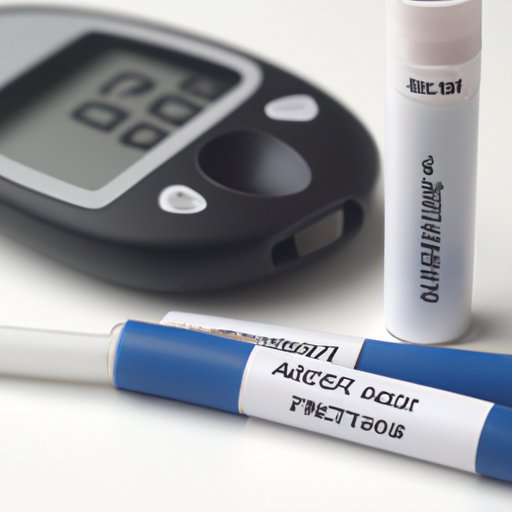
Introduction
A1C testing is a crucial part of managing diabetes and assessing blood sugar control. However, there is often confusion around whether fasting is necessary before undergoing the test. In this article, we’ll explore the myths and facts surrounding fasting and A1C testing, providing readers with the information they need to make informed decisions about their health.
The A1C Test and Fasting: What You Need to Know
The A1C test is a simple blood test which measures the average blood sugar levels over the past two to three months. This provides an accurate picture of how well blood sugar has been managed over time, which is essential in assessing diabetes control.
The question of whether fasting is necessary before taking the A1C test is a common one. The good news is that, unlike many other blood tests, it is not usually necessary to abstain from food and drink before taking the test. This is because the A1C test measures the average blood sugar levels over a prolonged period, rather than the immediate effects of food or drink. However, there are some situations where fasting may be recommended.
For example, if you are having other blood tests at the same time as your A1C test, your healthcare provider may advise you to fast overnight. Furthermore, if you are taking medications that can cause low blood sugar levels, your healthcare provider may recommend eating a light meal before the test to reduce the risk of hypoglycemia.
Understanding A1C and Fasting: What the Experts Say
According to the American Diabetes Association (ADA), fasting is typically not necessary before the A1C test. This is because studies have shown that fasting does not significantly impact the accuracy of the results. In fact, research shows that consuming a meal or snack before the test does not significantly alter A1C levels and does not affect clinical decisions based on the results.
However, there are some medical professionals who may recommend fasting before the A1C test, particularly if the test is being used to diagnose diabetes or assess diabetes treatment. They argue that fasting reduces variability in A1C levels and provides a more accurate baseline for assessing blood sugar control.
Debunking the Myth: Why Fasting May Not be Necessary for A1C Testing
While some healthcare providers may recommend fasting before A1C testing, the evidence suggests that this is unnecessary for most people. Studies have shown that fasting before the test does not significantly alter A1C levels or the accuracy of the results. Furthermore, fasting can sometimes lead to inaccurate results by causing spikes in blood sugar levels when food is eventually consumed.
Another factor to consider is that fasting can be inconvenient and uncomfortable for some people, particularly those with diabetes who may be at risk of hypoglycemia. By debunking the myth that fasting is always necessary for A1C testing, we can reduce the burden on patients and make the testing process more manageable and user-friendly.
A1C Testing Made Easy: Do You Really Need to Fast?
For most people, fasting is not necessary before taking the A1C test. This means that the test can be taken at any time of the day, without the need to fast overnight or abstain from food or drink. However, it is always important to follow the advice of your healthcare provider, who may recommend fasting based on your individual circumstances.
To ensure the most accurate and reliable results, it is important to prepare for the test as recommended by your healthcare provider. This may include avoiding medications or supplements that can affect blood sugar levels, and ensuring your blood sugar levels are within a target range.
The Pros and Cons of Fasting before Your A1C Test
While fasting is not typically necessary before A1C testing, there are some situations where it may be recommended. Here are some of the pros and cons of fasting before your A1C test:
Pros:
- Fasting can reduce variability in A1C levels and provide a more accurate baseline for assessing blood sugar control.
- Fasting may be beneficial for people who are having other blood tests taken at the same time, as it can help ensure accurate results for all tests.
Cons:
- Fasting can be inconvenient and uncomfortable for some people, particularly those with diabetes who may be at risk of hypoglycemia.
- Fasting is unnecessary for most people and can lead to inaccurate results by causing spikes in blood sugar levels when food is eventually consumed.
Fasting Before Your A1C Test: What Your Doctor May Not be Telling You
While fasting before A1C testing is a common practice, there is growing evidence to suggest that it may not be necessary for most people. Recent studies have shown that consuming a meal or snack before the test does not significantly alter A1C levels or the accuracy of the results. Furthermore, fasting can be inconvenient and uncomfortable for some people, particularly those with diabetes who may be at risk of hypoglycemia.
Despite this, many healthcare providers still recommend fasting before the A1C test. It is important to discuss your testing options with your healthcare provider and advocate for yourself if you feel that fasting is unnecessary or difficult.
Conclusion
In conclusion, fasting is not typically necessary before taking the A1C test, although your healthcare provider may recommend it based on your individual circumstances. By debunking the myth that fasting is always necessary for A1C testing, we can simplify the testing process and reduce the burden on patients. It is always essential to follow the advice of your healthcare provider and discuss your testing options with them to make informed decisions about your health.




